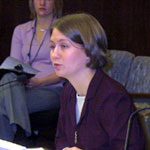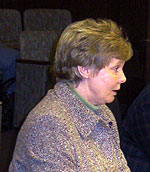Anti-abortion bill passes key committee
By Tom Scheck
Minnesota Public Radio
February 14, 2002
|
| RealAudio |
A key House committee has approved a measure that would forbid the state to issue family planning grants to groups that are connected in any way to abortion services. Supporters of the measure say abortion providers can continue to do business, but wouldn't be allowed to receive any state money. Opponents say the provision would impact low income women and say they'll challenge the bill's constitutionality if it becomes law.
| |
|
|
|
||
Abortion politics resurfaced at the Capitol as the House Health and Human Services Committee approved the bill on an 11-5 vote. Supporters say the legislation would force the state from giving any family planning money to groups that either conduct abortion services or refer women to abortion providers.
It has the backing of Minnesota Citizens Concerned for Life, a group opposed to legalized abortion. The MCCL's Andrea Rau says groups that conduct abortion services have become multi-million dollar businesses and don't need state funding.
"The question that is addressed with House File 3130 is whether or not the taxpayers want to fund a multi-million dollar industry that hurts women or kills unborn children. The question is whether Minnesota should remove itself from the battle of abortion?" according to Rau.
However, supporters of legalized abortion say no state family planning money goes directly to abortion services, but is earmarked to prevent teenage pregnancies and sexually transmitted diseases.
Connie Perpich, with Planned Parenthood of Minnesota, says they use the state's $680,000 in family planning grants to discourage unwanted pregancies and for other women's health needs. Perpich says her organization and others would sue the state if the bill become law on the basis of individual rights.
"We are the largest provider of birth control in the state of Minnesota, but we do support the consitutional right of women to obtain an abortion. We also believe we have constitutional protected rights to advocate, lobby and - when necessary - litigate on this issue," she told the panel.
| |
|
|
|
||
Perpich and others opposed to the legislation also say a large number of lower income women who use Planned Parenthood for health services would be impacted if the bill becomes law.
They say it also stops a doctor from discussing all health care options with their patients.
Members on the committee disagreed. Rep. Richard Mulder, R-Ivanhoe, who's also a doctor, says the proposed legislation won't stop lower income women from seeking medical assistance or abortions. He says there are plenty of providers who don't seek family planning money in the state.
"There is no lack of services for these people. Even for physicians who do or refer abortions in their clinic who are not getting family planning grants. They provide all of these services through the system that exists and this bill would not preclude any of these services from being provided to any woman of this state," Mulder said.
The proposal now moves onto the Health and Human Services Finance Committee. Similar legislation passed the House last year but was removed during budget negotiations at the end of the last session.
Health Commissioner Jan Malcolm says this year's proposal goes even farther than last year's bill because it applies to other grants besides Family Planning Grants.
"This is extremely broad language. From our first look at it, it appears to us that at least 160 different organizations that we're currently granting funds to through maternal and child health funding as well as family planning funding as well as the health disparities intitiatives that we've just begun. It looks to us as if a very large part of the front line public health delivery network might be impacted," according to Malcolm.
The chair of the DFL-controlled Senate Health, Human Services and Corrections Budget Division said it isn't likely the bill will become law this year because Gov. Ventura and the Senate will continue to oppose the measure.
More from MPR

